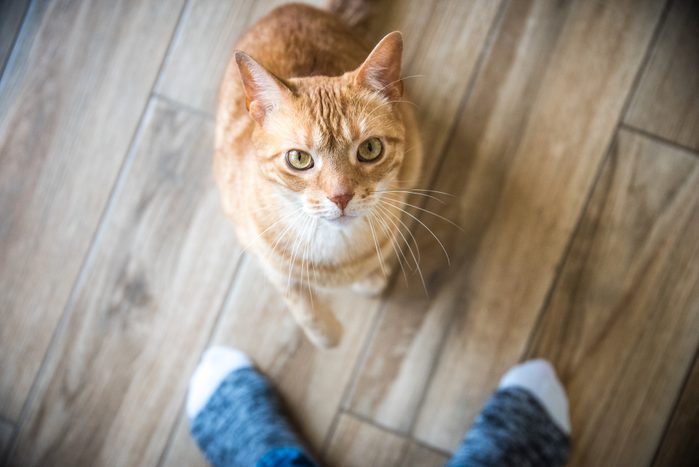Do Cats Know Their Names? Here’s What the Experts Say
Updated: Apr. 12, 2024

Cats run from the far corners of the house when they hear the sound of cat food being opened, but do they know their own name?
Cats might be skilled in always landing on their feet, keeping themselves clean and speaking their own language of meows and other cute cat noises. But do cats know their names? When you call them and they come running, can you tell from their cat body language that they know their name, or are they just happy it’s dinnertime?
Curious cat lovers want to know, so we asked a couple of cat experts to get the scoop.
But don’t stop there. Keep reading to discover why cats knock things over, how to keep cats off counters, what you can do to keep a cat from scratching furniture and perhaps most perplexing of all, why your cat bites you.
Get Reader’s Digest‘s Read Up newsletter for more pets, humor, cleaning, travel, tech and fun facts all week long.
What noises do cats recognize?
“While cats might not always understand what exactly we’re saying, they definitely can learn to associate sounds with good or bad outcomes, such as the sound of the treat bag rattling or the vacuum cleaner turning on,” says Mikel Delgado, a cat behavior expert with Rover. “When you talk to your cat, they probably respond most to your tone of voice. People tend to talk to their pets in higher-pitched voices, which are good at getting their attention.” AKA, your cat may like baby talk, according to a new study.
Cats can also recognize noises that indicate food or attention is coming. That might be the creaking of the pantry door, where they know their food’s kept, or the sound of your car pulling into the driveway at the end of the day. And while they may not be capable of calling you Mom or Dad, cats know the person behind those joyful sounds.
“Resources like food, territory, litter boxes and affection are so important to cats. They know who to associate with to ensure continuous resources,” says Samantha Bell, a cat expert with Best Friends Animal Society. And we’re OK with that because when they honey up to us, like when your cat rubs against you or licks your face, it’s a sure sign cats love us.
Do cats know their names?
A 2019 study found that cats respond more to the sound of their own names than any other words. Researchers observed cats in ordinary households and cats living in cat cafes. To each cat, they said four different words that were the same length and had the same accents as their own name. If a cat responded in an orienting way—meaning when it heard its own name, it moved its head and ears toward the voice—the researchers knew the cat could differentiate its name from other words.
But the cafe cats didn’t respond to their names nearly as often as the household cats did. Researchers suggest cafe cats might not recognize their names because their social environment is vastly different. It’s harder for a cat to discriminate their own name from other cat names in the cafe when so many phonetic characteristics of their name are spoken.
That’s understandable for cafe cats, but what about your cat? Do cats know their names when, say, your friend stops by and calls for them?
“Your cat is more likely to respond to their human’s voice versus a stranger’s voice,” says Delgado. “In fact, a study in Japan found that cats showed more behavioral responses when they heard their parent’s voice calling their name than a stranger’s voice.” Researchers discovered this by repeatedly playing the cat’s name in three voices, followed by the cat’s parent’s voice. Not so surprising, 15 of the 20 cats demonstrated a lackluster response when they heard a stranger’s voice call their name but had a significant rebound response when they heard their parent’s voice.
How can you help your cat learn its name?
Whether you choose one of the best cat names for your new boy or girl kitten or go with one of these funny cat names to christen a spunky new shelter cat, you can help your cat learn its own moniker in no time with a little positive reinforcement.
Just keep one critical training tip in mind. “The reward is extremely important. Make sure the reward is truly their favorite thing and not what you assume they like,” says Bell. “If their favorite thing is a treat of some kind, offer them several treats and narrow them down to the one they choose most often.” If your cat isn’t motivated by food, and playtime or petting is considered the cat’s meow, use that instead.
Next, say their name, and when they show recognition, reward them. If the reward is food, break up the treat into tiny pieces. Bell says a cat’s stomach is about the size of a ping-pong ball. Once that space is filled up, the motivation is gone. Keep the training sessions short, and stop if your cat is annoyed or bored.
Can you train cats to know other words besides their name?
Do cats know their names? It seems they do. Now you might be wondering if you can build your cat’s vocabulary. Cats are just as trainable as the smartest dog breeds and capable of learning many words. Plus, you can train a cat to do amazing, life-changing things.
First, keep training sessions short and sweet, and have those high-value rewards handy. “I’ve been able to train cats in a single one-minute session before, but sometimes it takes a couple one-minute sessions. It depends on the cat’s mood and environment,” says Bell. Start with an easy word, like “treat.” You say “treat” and give your cat a treat. They’ll pick that up in no time.
Next, try some words that teach helpful behaviors, like “come.” This will be handy when your little fluffball has disappeared in the house and you can’t find them. “Start out by luring your cat toward you with their favorite reward. As they move toward you, add in the cue ‘come.’ Pretty soon, they will associate the word ‘come’ with moving toward you and being rewarded,” says Bell.
If you’re crazy for all things cat, you might also be wondering why cats love boxes and why cats wag their tails, and we have the answers for you!
Sources:
- Mikel Delgado, cat behavior expert with Rover
- Samantha Bell, cat expert with Best Friends Animal Society
- Scientific Reports: “Domestic cats (Felis catus) discriminate their names from other words”
- Animal Cognition: “Vocal recognition of owners by domestic cats (Felis catus)”


